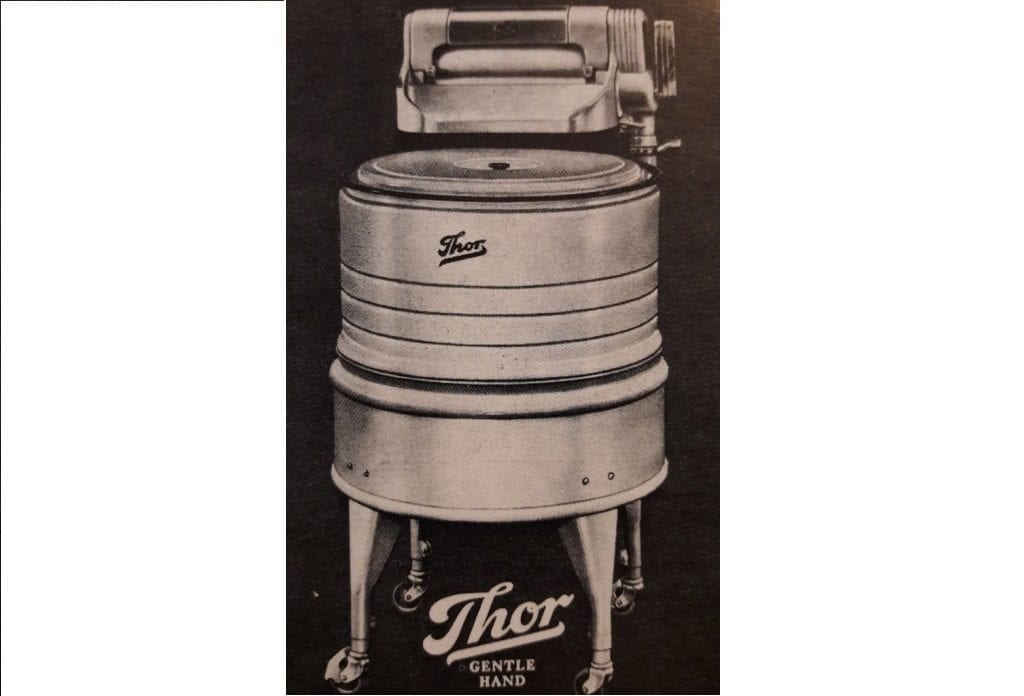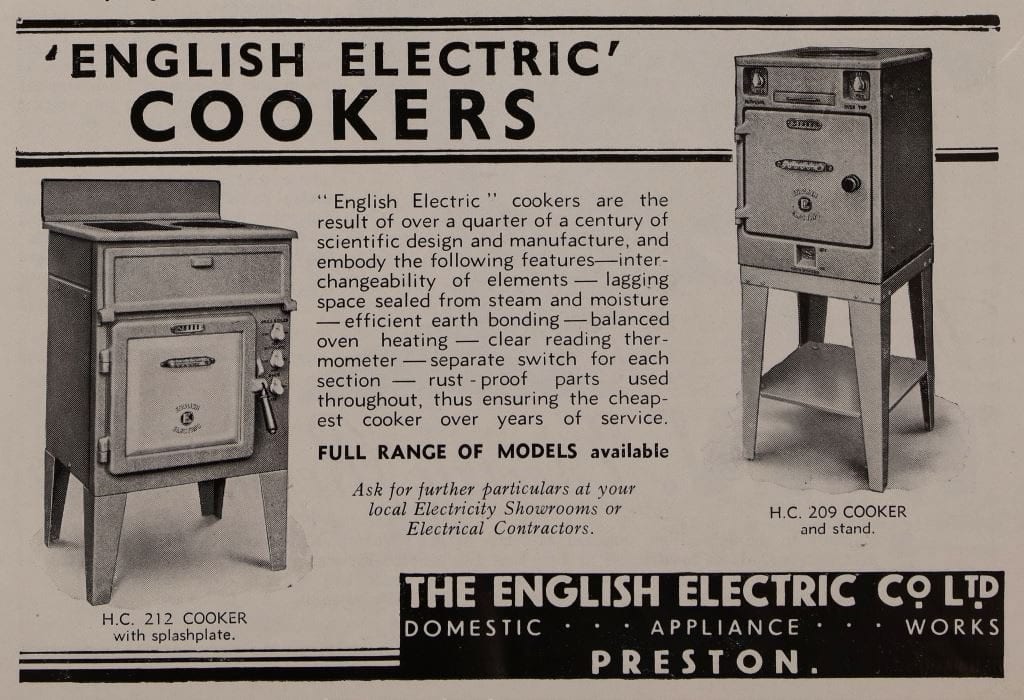Eleanor Peters is a University of Aberdeen PhD student. She has been using the Queen’s College, Glasgow (formerly the Glasgow and West of Scotland College of Domestic Science) records, which are in the final stages of being catalogued as part of the Wellcome Trust Research Resources Project. Many thanks to Eleanor for sharing the fascinating information she has found from the records. I wonder what other areas of research the catalogue will unlock when it goes live later this year. (KM)
Over the last year, I have had the pleasure of visiting the Glasgow Caledonian University (GCU) archive several times to carry out research for my PhD. As a part-time research student in the second year of my studies, my thesis is still very much ‘taking shape’; however, it was the records for the Glasgow and West of Scotland College of Domestic Science (GWSCDS) which inspired the subject matter of my PhD: Electricity and Domestic Science Institutes in Scotland and England c.1910-1939.
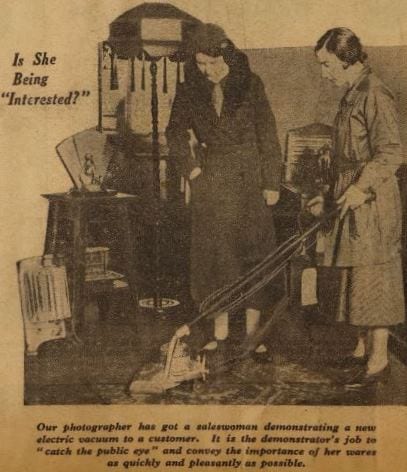
Demonstrating an electric vacuum cleaner, Newspaper cutting February 1934.
Women played an integral role in promoting the uptake of gas appliances in Britain in the late 1800s; large audiences gathered to watch female appliance demonstrators (also known as ‘Lady Demons’!) cook using gas stoves.[1] I wondered if women had also played an active role in demonstrating electrical appliances; being a student at the University of Aberdeen, I naturally turned my attentions to electrical appliance demonstrations in Scotland first. At large scale public exhibitions like the Ideal Home Exhibition and Scotland’s Empire Exhibition, held in Glasgow in 1938, women demonstrated both gas and electrical appliances. Many appliance demonstrators worked at domestic science institutes like the Edinburgh School of Cookery and Domestic Economy (ESCDE) and the GWSCDS.
Eager to find out more about the relationship between the women at the GWSCDS and the electrical industry, I visited the GCU archive to consult several decades’ worth of minute books for the College. These books revealed that the staff members of the GWSCDS were the enthusiastic recipients of electrical appliances from 1917 onwards; in November of that year the Glasgow Corporation Electricity Supply Department offered to install an electric cooker, free of charge, (but ‘removable at the Corporation’s pleasure’) into 504 Sauchiehall Street.[2]
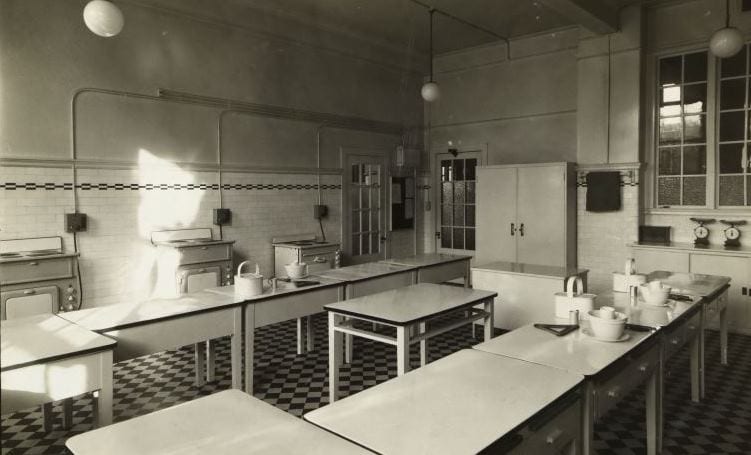
GWSCDS white kitchen with electric cookers, 1936
The Corporation remained generous; in February 1919 they moved the cooker from Sauchiehall Street and re-installed it in the GWSCDS’s new premises on Park Drive along with another two additional electric cookers. The College’s Cookery Committee praised the Corporation and agreed that it was beneficial for students to become ‘acquainted with electrical apparatus’.[3] With no end date to the loan or pressure to purchase an electric cooker from the Corporation, the College’s first experience with electric cookers was under favourable conditions. The ESCDS had received an electric stove on a six month trial three years earlier than the GWDSCS, but it had been removed when the ESCDS refused to make a purchase from the installer.
- Electric washing machine advert, 1936
- Electric cooker advert, 1936
The Glasgow Corporation’s generosity towards the GWSCDS demonstrates how significant it was for local representatives of the electrical industry to forge successful relationships with domestic science institutes to secure advertisement of electrical appliances. During the inter-war period electrical appliances were prohibitively expensive for the majority of the population; the uptake of appliances was low among householders.[4] In 1919 the Electrical Development Association (EDA) was created in an attempt to produce ‘collective’ advertising for the electrical industry on a national scale. Nevertheless, during the later years of the inter-war period local advertising efforts remained integral to the electrical industry’s marketing campaigns. In 1932 the Glasgow Corporation liaised with the Falkirk Iron Company to obtain a large electric oven, a large broiling table and electric griddle for the GWSCDS with a fifty per cent discount on price.[5]
The relationship between electrical appliances manufacturers and the GWSCDS was mutually beneficial; domestic science teachers were eager to incorporate electrical appliances into their lessons. In 1924 the GWSCDS Laundry and Dressmaking Committee discussed the benefits of purchasing an electric washing machine; they claimed that the machine was necessary to keep the GWSCDS ‘up-to-date’ and to save time expended on labour in actual washing, so that the students might have more time for skilled practice in ironing.[6] To the delight of the Committee, a Thor washing machine was purchased by the GWSCDS in 1926.
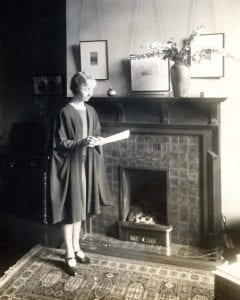
Dorothy Melvin, Principal of the GWSCDS, 1931
Dorothy H. Melvin, Principal of GWSCDS from 1910 to 1946, demonstrated her prowess in her negotiations with the electrical industry. Melvin ensured that her College was not the passive recipient of electrical appliances; she understood the powerful role which the GWSCDS could play in promoting the uptake of appliances among domestic consumers. In 1928, after visiting the Ideal Home Exhibition in London, Melvin was pleased to report that she had negotiated with the makers of a compact electric washing machine and as a result there was to be one installed in the GWSCDS for free as an advertisement.[7]
By providing GWSCDS with free or discounted electrical appliances, manufacturers were ensuring that hundreds of students would be taught how to use electric stoves, vacuum cleaners, washing machines and dishwashers. The GWSCDS could then provide a pool of expert demonstrators to use the appliances when required. The quarterly publication, The Electrical Age (discussed in a previous blog by Kirsty Menzies) described the activity of the GWSCDS in 1937: ‘(…) the forerunners of the electrical demonstrators training in the present College, went bearing Little Mistress Stoves to give cookery demonstrations in towns and villages’.[8] Members of domestic science institutes from Edinburgh and Aberdeen also demonstrated electrical appliances across the country; their audiences ranged from groups of boy scouts to branches of the Women’s Institute.
Upon discovering the dearth of secondary material which has been written on the subject of the British domestic science movement I have become increasingly motivated to focus exclusively on domestic science institutes in my thesis. Little has been written about the early adopters of domestic electrical appliances. GWSCDS provides an example of the forgotten, but significant, relationship which local representatives of the electrical industry forged with female- dominated domestic science institutes in an attempt to increase the uptake of electrical appliances in the domestic sphere in Scotland during the twentieth century.
Eleanor Peters, University of Aberdeen
References
[1] Anne Clendinning, ‘“Deft fingers” and “persuasive eloquence”: the ‘lady demons’ of the English gas industry, 1888-1918’, Women’s History Review 9, no. 3 (2000): 501-537.
[2] The Glasgow Corporation Electricity Supply Department was a local authority undertaking which was merged into the South of Scotland Electricity Board in 1955. Meeting of the Committee on Cookery 21 November 1917, Minutes of meetings (1917-1923), GB1847 QC/1/2/1/3, Queen’s College, Glasgow, records, GCU archive, Glasgow.
[3] Meeting of the Committee on Cookery 12 February 1919, Minutes of meetings (1917-1923), GCU archive.
[4] Sue Bowden and Avner Offer, ‘The technological revolution that never was: gender, class, and the diffusion of household appliances in interwar England’, in The sex of things: gender and consumption in historical perspective, ed. Victoria de Grazia and Ellen Furlough (Berkeley and Los Angeles: University of California Press, 1996), 244-274, esp. 250-254.
[5] Meeting of Governors 30 June 1932, Minutes of meetings (1923-1934), GB1847 QC/1/2/1/4, Queen’s College, Glasgow, records, GCU archive, Glasgow.
[6] Meeting of the Laundry and Dressmaking Committee 27 May 1924, Minutes of meetings (1923-1934), GCU archive.
[7] Meeting of the Laundry and Dressmaking Committee 21 June 1928, Minutes of meetings (1923-1934), GCU archive.
[8] Anne R. Macarthur, ‘Sixty-two years: from a philanthropic venture to an important educational establishment’, The Electrical Age 3, no. 7 (1937): 252-254, esp. 252.
